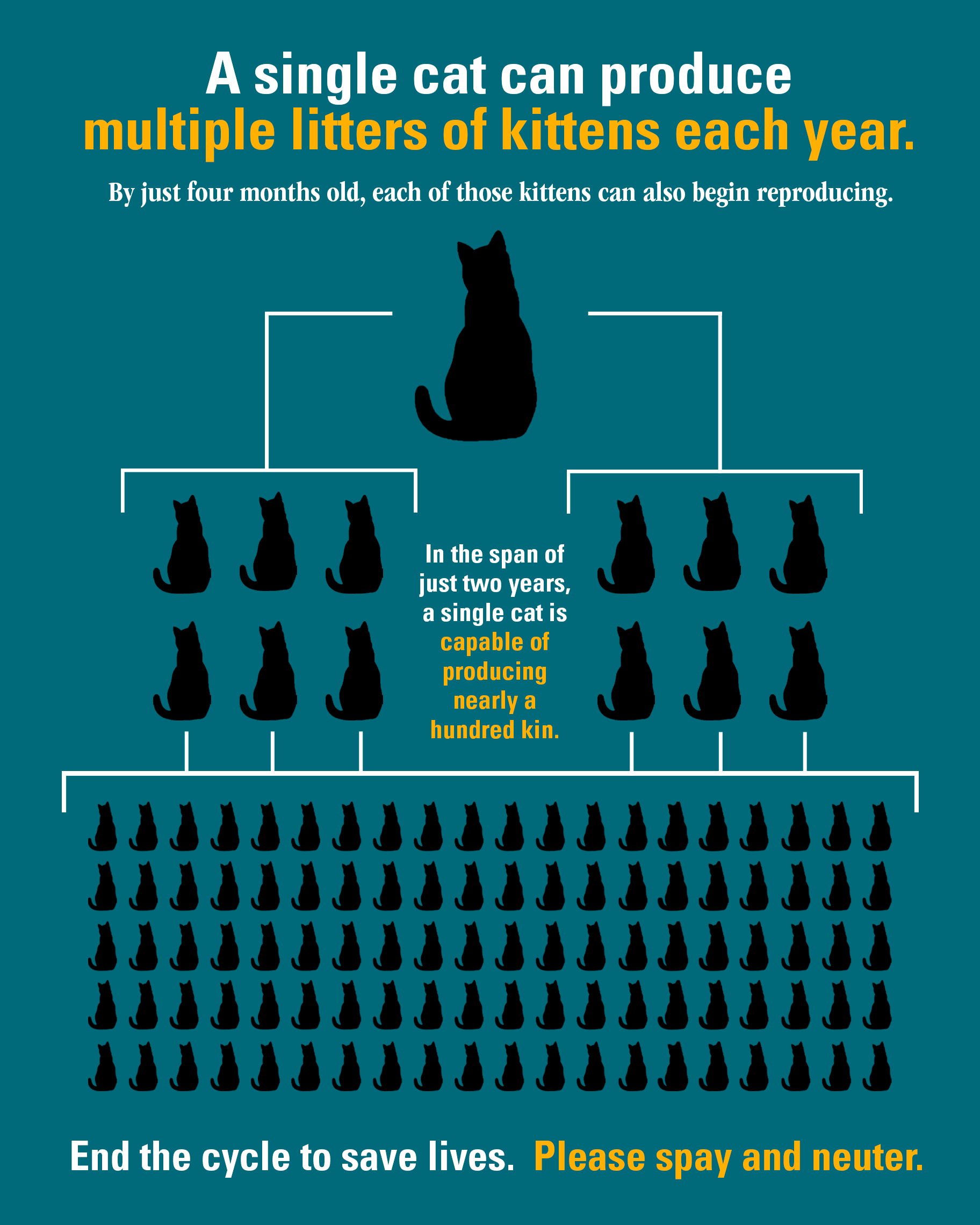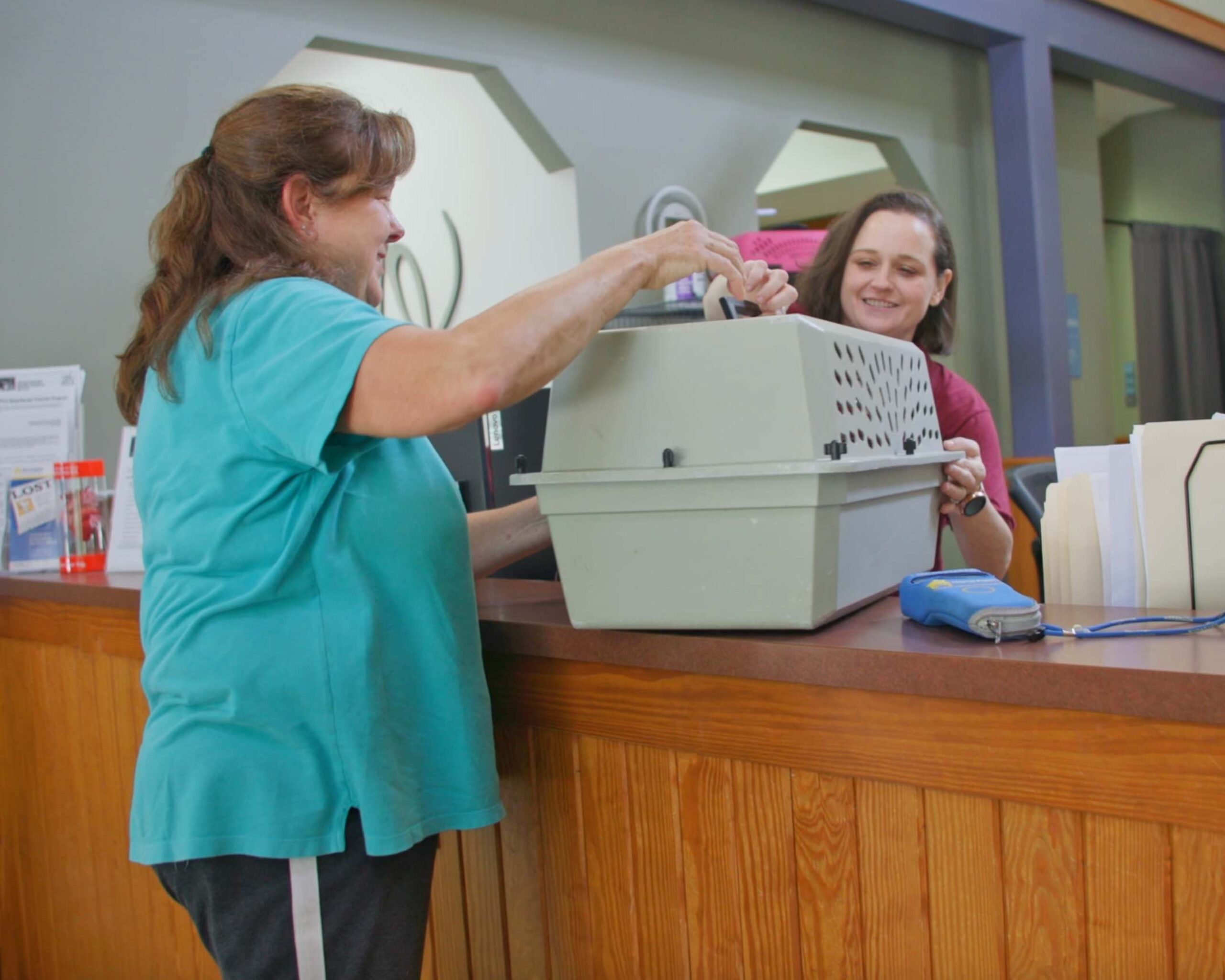North Carolina is filled with unowned cats who live together in groups called colonies, spending their entire lives outside, breeding freely, and multiplying out of control. You've most likely seen these cats roaming around your own neighborhood. Each summer during the cats' breeding season, often called "kitten season", county shelters are inundated with surrenders of stray cats and kittens. This burden of incoming cats is crippling to shelters due to limited space and resources, and as a result, cats and kittens are euthanized by the tens of thousands every year in our state. In 2021, 28% of the felines that entered NC shelters never left. [1]
In an effort to relieve the stress on these shelters and provide specialty medical care beyond what those shelters have the ability to provide, SPCA Wake takes in thousands of these cats and kittens from our shelter partners each year. But unless we tackle the root cause of this cat overpopulation, the numbers will never go down.
This is why SPCA Wake has been building out a suite of programs designed to do just that — offering low-cost (or free) spay/neuter surgeries for unowned cats, providing veterinary services critical to public health such as Rabies vaccines, and empowering local volunteers and good Samaritans with the tools, education, and resources to help them manage unowned cat colonies in their own neighborhoods.
Saving Cats and Kittens by Tackling Overpopulation at the Source (Part 5/6)
You might be thinking "why can't these cats be placed up for adoption?" And certainly, some can! Many unowned cats are simply abandoned pets who are used to living in a home and enjoy the affection of humans. Many are young kittens who, with a little socialization in a foster home, will grow up to be wonderful, loving companions.
But just as many of these outdoor cats are "feral", meaning they have grown up away from people their entire lives and do not enjoy human company whatsoever. It's important to note that cats can only be socialized to humans during a critical period when they are young, and if they miss this window due to living outside on their own, they will never become the loving house cat a family is looking for — nor would they be happy living in a home environment surrounded by people they find scary.
It Starts with Spay & Neuter
Instead, these feral cats can go through a process called trap-neuter-vaccinate-return (also known as TNVR or TNR).
Here's how it works.
- A volunteer sets out humane cat traps baited with food in order to collect the feral cats.
- The cats are then brought to a veterinarian or spay/neuter clinic to be sterilized, vaccinated against Rabies, and marked with an "ear tip" (where the tip of their left ear is clipped to clearly indicate that a cat is already sterilized).
- The cat is then returned to its original location where he or she is already established and familiar with the area, but now the cat can no longer continue breeding.
A single unsterilized cat is capable of producing multiple litters of kittens each year. Without intervention, those kittens can have more kittens of their own, and so on and so forth.
Within the span of just a few years, a single cat can multiply into a hundred or more. Which is why early prevention with spay and neuter is critically important in addressing this cycle of overpopulation.
Spay and neuter has a ripple effect that saves lives by reducing the number of cats entering our county shelters.

Spaying and neutering cats reduces pet overpopulation, which in turn alleviates pressure on county shelters and prevents the euthanasia of many more cats and kittens.
Hear from Jan Pridgen, a realtor by day and animal welfare volunteer by night, who has spent decades managing the cat colonies of Garner, NC and beyond. Jan first got involved with cat colonies after moving to the Raleigh area and noticing that there were unowned cats everywhere. She began her efforts as many of us do, by setting out daily food and water to feed the hungry cats in her neighborhood.
Jan Pridgen, a good Samaritan from Garner, NC, brings a litter of colony kittens to SPCA Wake so they can be socialized, medically treated, sterilized, and adopted.
In the years since, Jan has repeatedly seen the scale of the problem firsthand and committed herself to doing what she can to help address the overpopulation problem — whether that means traveling around to known colony locations to provide sustenance or shelter, trapping unsterilized cats to bring to SPCA Wake for spay/neuter surgery and a rabies vaccine, or collecting young litters of kittens that can be spared the dangers of living outdoors and instead be placed for adoption into a safe, loving home.
Over the years, Jan has rescued hundreds of kittens and stewarded countless cats through their spay/neuter surgeries through SPCA Wake's low-cost Spay/Neuter clinic — efforts that have prevented thousands of new cat births, which in turn saves just as many lives by reducing the number of cats in our local shelters. In the short video above, Jan shares her personal experience looking the cat overpopulation issue in the eye and discusses the importance of these preventative programs to end the cycle of overbreeding, overpopulation, and the resulting suffering and lives lost.
The need for these programs is greater than currently available services are able to provide. By donating, volunteering, fostering cats and kittens, or getting involved with the TNVR of cats in your own neighborhood, you can directly help these programs expand to meet the needs of our community and save the lives of many more animals.
With your support, we can rescue cats and kittens and provide affordable spay/neuter surgeries at a greater scale, which will not only save countless shelter pet lives, but help prepare our future to be a more humane community where the population numbers are low enough that every cat, stray or owned, can get the help they need.
Make a donation today to help expand and support programs like these.
SPCA Wake is a 501(c)3 nonprofit rescue headquartered in Raleigh, North Carolina. Each year, your support helps to save the lives of over 4,000 cats, dogs, and small pets through our rescue and adoption program. Our mission is to create a humane community for pets and people, to end the euthanasia of adoptable pets, and to change the hearts and minds of people across North Carolina.

